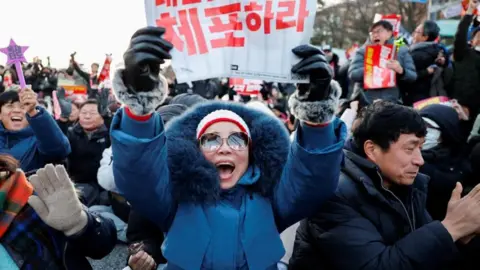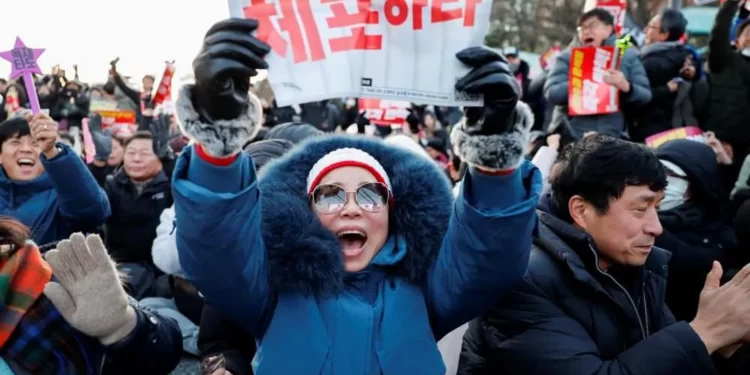South Korea has voted to impeach President Yoon – now what?
South Korean lawmakers have voted to impeach President Yoon Suk Yeol over his failed attempt to impose martial law, which sparked massive protests across the country.
He was suspended after some members of Yoon’s own People Power Party (PPP) voted with the opposition – though the decision still needs be ratified by the constitutional court.
Thousands of anti-Yoon protesters celebrated outside the National Assembly on Saturday evening after the impeachment motion passed, with the crowd singing as fireworks broke out overhead.
Yoon has vowed to fight on and said he “will never give up”, describing the vote as a temporary pause to his presidency.
“I will take your criticism, praise, and support to the heart and do my best for the country until the end,” Yoon added.
His defiant words are a marked change from his apologetic tone earlier this month over his short-lived martial law declaration.
Yoon attempted to impose military rule after months of political deadlock, saying it was necessary to block supposed North Korean efforts to undermine his government – but the declaration was overturned after a matter of hours by MPs.
There has been strong public support for Yoon’s impeachment, with recent polls finding three-quarters of South Koreans wanted to see him go.
Following days of public pressure the PPP had decided to let its lawmakers vote on the motion, after an effort to impeach Yoon last week failed when its lawmakers boycotted the hearing.
On Saturday, the impeachment motion reached the two thirds threshold needed to pass after 12 members of Yoon’s party voted in favour.
“To the people, we hope your end of year will be a little happier now, and all your cancelled year-end celebrations to be restored,” said National Assembly Speaker Woo Won-shik, as he announced the result.
“The future of the Republic of Korea and our hope is in the hands of the people, our hope is strong,” Woo, a member of the main opposition Democratic Party, added.
The constitutional court now has 180 days to rule on whether Yoon’s impeachment should be upheld or whether he can return to office. If it rules in favour of impeachment, an election for the next president must be called within 60 days.
Yoon has been suspended while Prime Minister Han Duck-soo has taken over as acting president.
Han said his focus is to “stabilise the situation” and “bring back normalcy for the people”.
However, both Han and finance minister Choi Sang-mok, who is next in line for the presidency, are both involved in an ongoing police probe over last week’s events.
 Reuters
ReutersOutside the National Assembly, where tens of thousands of protesters gathered throughout the day despite the bitter cold, people hailed the vote as a victory for democracy and spoke of their determination to see Yoon permanently leave office.
“I’m so happy that the bill passed… At the same time, the fight is not over,” physical therapist Sim Hee-seon told the BBC as she wiped her tears.
“We’ll have to wait for the court’s judgment for his impeachment to be finalised. We will keep watching.”
Two women decked out in Rudolf costumes held signs that read: “[It will be] a merry Christmas only if Yoon Seok Yul disappears”.
Across town at a pro-Yoon rally in Gwanghwamun Square, it was a different story. His supporters fell silent after hearing the news of the vote. Some people uttered angry insults before leaving the scene.
The success of the vote had depended on the support from the PPP, as the opposition lawmakers who tabled the motion needed just eight more to join them. Last Saturday, when the opposition first tried to impeach Yoon, they fell short by just a few votes as the PPP staged a walkout.
On Saturday, the party held a marathon meeting that began at 10am and lasted till just minutes before the voting session began, as PPP lawmakers struggled to reach a consensus on the party’s stance.
In the end, the party agreed to take part and allowed their lawmakers to vote according to their conscience. It appeared that at least 12 of them crossed the floor. Another 85 voted against impeachment.
 Getty Images
Getty ImagesSouth Korea has faced nearly two weeks of chaos and uncertainty since Yoon’s short-lived martial law attempt late last Tuesday.
Yoon had cited threats from “anti-state forces” and North Korea but it soon became clear that his move had been spurred by his own domestic political troubles, not by external threats.
Hours later he reversed the order after 190 MPs voted it down, with many of them climbing fences and breaking barricades to get into the voting chamber.
Yoon later apologised but on Thursday he defended his actions, saying he had sought to protect the country’s democracy and vowed to “fight on until the end”.
That speech galvanised people, and the president’s approval rating tumbled to a record low of 11%, according to a poll by Gallup Korea.
The impeachment of a president is not unchartered territory for South Korea, which last removed former president Park Geun-hye through this process in 2016.
Yoon – then a prosecutor – had led the investigation against Park, which ultimately resulted in her impeachment.
Additional reporting by Leehyun Choi, Jake Kwon and Yuna Ku in Seoul







